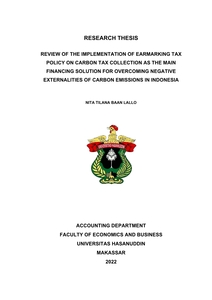Lallo, Nita Tilana Baan (2022) REVIEW OF THE IMPLEMENTATION OF EARMARKING TAX POLICY ON CARBON TAX COLLECTION AS THE MAIN FINANCING SOLUTION FOR OVERCOMING NEGATIVE EXTERNALITIES OF CARBON EMISSIONS IN INDONESIA. Skripsi thesis, Universitas Hasanuddin.
![[thumbnail of Cover]](/26673/1.hassmallThumbnailVersion/A31116806_skripsi_01-02-2023%20cover1.jpg)

A31116806_skripsi_01-02-2023 cover1.jpg
Download (295kB) | Preview
A31116806_skripsi_01-02-2023 bab 1-2.pdf
Download (1MB)
A31116806_skripsi_01-02-2023 dp.pdf
Download (209kB)
A31116806_skripsi_01-02-2023.pdf
Restricted to Repository staff only until 23 May 2025.
Download (1MB)
Abstract (Abstrak)
The worsening world climate conditions prompted the formulation of a policy that could reduce the increase in the earth's temperature, mostly from greenhouse gas (GHG) emissions. The carbon tax policy is formulated as a solution to this problem. The carbon tax is a tax imposed on economic activities that have the potential to produce carbon emissions. The need for a carbon tax policy to be implemented in Indonesia is essential, given Indonesia's commitment to reduce the amount of GHG emissions as stated in the Paris Agreement, an agreement between countries that regulate GHG emission reduction. In addition, the Indonesian economy, which is still entirely dependent on the energy sector that produces carbon emissions, has further strengthened the urgency of the presence of a policy that can reduce these emissions. Several countries have started implementing carbon tax policies with their respective formulas that are adjusted to the structure and conditions of their economy. Indonesia itself cannot simply implement a carbon tax policy without a proper model. The government must also consider various impacts, such as the increase in the price of primary goods at the final level felt by the community. The allocation of revenue received from the application of carbon tax must also be a factor that is well studied so that the government can adequately distribute it without reducing the main objective of implementing the carbon tax itself.
Keywords: carbon tax, emission, environment, environmental tax, externality, paris agreement, climate change
| Item Type: | Thesis (Skripsi) |
|---|---|
| Uncontrolled Keywords: | pajak karbon, emisi, lingkungan, pajak lingkungan, eksternalitas, perjanjian paris, perubahan iklim |
| Subjects: | H Social Sciences > HB Economic Theory |
| Divisions (Program Studi): | Fakultas Ekonomi > Ilmu Akuntasi |
| Depositing User: | S.Sos Rasman - |
| Date Deposited: | 25 May 2023 01:53 |
| Last Modified: | 25 May 2023 01:53 |
| URI: | http://repository.unhas.ac.id:443/id/eprint/26673 |


